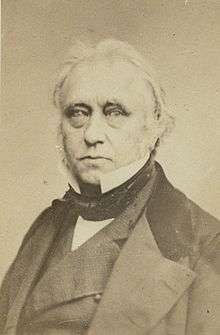Macaulayism

Macaulayism is the conscious policy of liquidating indigenous culture through the planned substitution of the alien culture of a colonizing power via the education system. The term is derived from the name of British politician Thomas Babington Macaulay (1800-1859), an individual who was instrumental in the introduction of English as the medium of instruction for higher education in India.
History
Thomas Macaulay
Thomas Babington Macaulay was born in Leicestershire, England on 25 October 1800, the son of a former African Colonial Governor and anti-slavery activist.[1]
Elected to the House of Commons of the United Kingdom in 1830 as a member of the reformist Whig party, four years later Macaulay was named as an inaugural member of a governing Supreme Council of India.[1] Macaulay spent the next four years in India, where he devoted his efforts to the reform of the criminal code of the colony and the establishment of an educational system based upon the British model.[1]
Macaulay held western culture in high esteem and saw his undertaking as a "civilizing mission": "We must at present do our best to form a class who may be interpreters between us and the millions whom we govern; a class of persons, Indian in blood and colour, but English in taste, in opinions, in morals, and in intellect. To that class we may leave it to refine the vernacular dialects of the country, to enrich those dialects with terms of science borrowed from the Western nomenclature, and to render them by degrees fit vehicles for conveying knowledge to the great mass of the population," Macaulay declared.[2]
"Macaulayism" and modern India
In the independent nation of India which emerged in the second half of the 20th century, Macaulay's name has become emblematic for the ills of colonialism. Macaulay and the British education system have been blamed for producing a generation of Indians not proud of their distinct heritage.[3]
Speaking at a national seminar on "Decolonizing English Education" in 2001, professor Kapil Kapoor of Jawaharlal Nehru University declared that one of the byproducts of mainstream English language education in India today has been its tendency to "marginalize inherited learning" and to have uprooted academics from traditional Indian modes of thought, inducing in them "a spirit of self-denigration (heenabhavna)."[4]
Author Rajiv Malhotra has bemoaned the "continuation of the policy on Indian education started by the famous Lord Macaulay over 150 years ago" for the virtual banishment of classic Indian literature from the country's higher academic institutions and the emergence of a "new breed" of writers professing a "uniquely Indian Eurocentrism."[5]
Vestiges of Macaulayism are also seen by many Hindu nationalists as a mechanism of British neocolonial control in India.[6]
See also
- Neocolonialism
- Indian independence movement
- Hindu nationalism
- Cultural genocide
- White man's burden
- Gradual Civilization Act
Footnotes
- 1 2 3 "Thomas Babington Macaulay," age-of-the-sage.org/ Retrieved March 16, 2011.
- ↑ "MACAULAY'S MINUTE ON INDIAN EDUCATION,"
- ↑ Christophe Jaffrelot, Hindu Nationalist Movement and Indian Politics: 1925 to the 1990s. New York: Viking Press, 1996; page 343.
- ↑ Kapil Kapoor, "Decolonizing the Indian Mind: Keynote Address to the National Seminar on Decolonizing English Education, Department of English, North Gujarat University, Patan (Gujarat, India), February 18, 2001." veda.com/ Retrieved March 11, 2011.
- ↑ Rajiv Malhotra, "The Axis of Neocolonialism," February 12, 2006.
- ↑ Thomas M. Leonard, Encyclopedia of the Developing World: Volume 1, London: Routledge, 2005; page 1119.